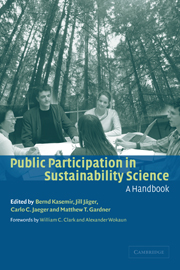Book contents
- Frontmatter
- Contents
- Notes on contributors
- Foreword: science, participation, and sustainability
- Foreword: sustainability, energy use, and public participation
- Preface
- Acknowledgments
- Part I Concepts and insights
- Part II Experiences with IA Focus Groups
- Part III Further forms of participation
- Introduction
- 7 Venture capital and climate policy
- 8 COOL: Exploring options for carbon dioxide-reduction in a participatory mode
- 9 Expert stakeholder participation in the Thames region
- 10 On the art of scenario development
- Part IV Future perspectives
- References
- Index
8 - COOL: Exploring options for carbon dioxide-reduction in a participatory mode
Published online by Cambridge University Press: 22 September 2009
- Frontmatter
- Contents
- Notes on contributors
- Foreword: science, participation, and sustainability
- Foreword: sustainability, energy use, and public participation
- Preface
- Acknowledgments
- Part I Concepts and insights
- Part II Experiences with IA Focus Groups
- Part III Further forms of participation
- Introduction
- 7 Venture capital and climate policy
- 8 COOL: Exploring options for carbon dioxide-reduction in a participatory mode
- 9 Expert stakeholder participation in the Thames region
- 10 On the art of scenario development
- Part IV Future perspectives
- References
- Index
Summary
Introduction
The ULYSSES study has been an interesting exercise, unique in its variety of research groups spread all over Europe with different research backgrounds and different foci, yet all embarking on a shared voyage. What does this experience teach us for other initiatives of participatory projects? What news do the voyagers bring to the ones ashore and what do they tell about new coasts and the adventures on their way?
We address this question from the point of view of researchers taking up a similar endeavor, though with a different starting point and looking from a different angle. The authors are involved in the Climate OptiOns for the Long term Project (COOL). The Dutch COOL project focuses on long-term (up to 2050) options to realize far-reaching carbon dioxide emission reductions. Stakeholder dialogues are central to this project. As in the study discussed in the first parts of this volume, the use of knowledge and know-how of experts other than scientific experts is an important element in COOL.
In this chapter we discuss experiences from the ULYSSES project that are especially relevant for other Participatory Integrated Assessment projects like COOL. We will start with a short introduction to the COOL project in order to make clear why the ULYSSES experiences are relevant for COOL. This includes some reflection on differences and similarities between the two research efforts. Then we turn to specific experiences gained from ULYSSES, which focus on the process, the outcomes, and the multilayered purpose of the project.
- Type
- Chapter
- Information
- Public Participation in Sustainability ScienceA Handbook, pp. 176 - 186Publisher: Cambridge University PressPrint publication year: 2003
- 4
- Cited by

